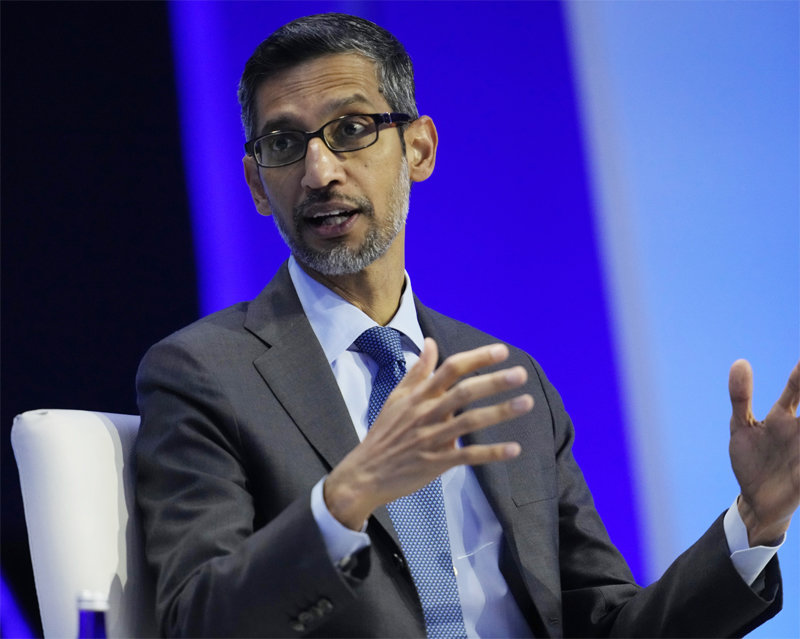Google embarrassed by wrong answers during chatbot ‘Bard’ demo
Prepared answers instead of real-time scenes
“Hasty disclosure after losing out to Open AI-MS”
Controversy over Open AI-MS monopoly arises between the US and UK
A person is drawing a duck. Artificial intelligence (AI) recognizes this and gives the correct answer, “It swims in water and has a beak, so it is a duck.” When they paint the duck blue, they say, “It’s a rare color for ducks.” This is a scene from the multi-modal AI ‘Gemini’ demonstration video that Google ambitiously released on the 6th (local time). At the time, praise poured in for the fact that multimodal AI, which can see, hear, and speak, observes the real world, makes inferences, and responds verbally.
However, this 6 minute 22 second video was not recorded in one cut without editing the entire process of Gemini’s perception and reaction. What Gemini actually saw was not an object that a person was drawing in real time and creating a reality, but a picture of the finished object, and she did not even communicate with the person by voice. What she showed to her Gemini, and Gemini’s response, were edited videos that were cut and pasted together with audio added for dramatic effect.
 Google CEO Sundar Pichai attended the Asia-Pacific Economic Cooperation (APEC) CEO Summit held in San Francisco, USA on the 16th of last month. San Francisco = AP Newsis
Google CEO Sundar Pichai attended the Asia-Pacific Economic Cooperation (APEC) CEO Summit held in San Francisco, USA on the 16th of last month. San Francisco = AP NewsisEarly this year, when Google launched and demonstrated a chatbot called ‘Bard’ as a competitor to Open AI ‘ChatGPT’, the wrong answers were revealed and the stock price fell. There is an analysis that Google, which has the world’s largest AI development organization, may have overdone itself by trying to hastily change the AI technology competition phase that was behind ChatGPT.
When Bloomberg News revealed on the 8th that the Gemini demonstration video was an edited video, Google admitted, “It was not conducted in real time, but was produced based on pre-prepared images and text.” He added, “The demonstration video is an illustrative depiction of how (users and AI) can interact with Gemini’s multimodal function.” In a column that day, Bloomberg criticized, “Slow search giants are struggling to show themselves ahead of ChatGPT.” The situation became more urgent as Google lost out to Open AI and Microsoft (MS) in the AI market, which grew after ChatGPT.
In particular, there is an analysis that Google hastily released Gemini as companies trying to increase AI investment due to the recent Open AI incident recognized the risks of relying on a single AI model and tried to find alternatives. ‘Gemini Ultra’, which Google said surpasses the performance of OpenAI GPT 4, is scheduled to be released next year and has not been released to the public. “The duck demonstration is a feature that is still in the research phase,” Ellie Collins, vice president of product at Google DeepMind, told Bloomberg.
‘Gemini Pro’, which is similar to ChatGPT 3.5 version, was released by applying it to Bard, but some say its performance does not meet expectations. In fact, when a reporter asked in English, ‘Please give me the latest information on the war between Israel and Hamas,’ the only response was, “The conflict situation is changing rapidly, so search on Google.”
It’s not just Google that’s anxious. Market research company IDC predicted that global companies spent $16 billion (approximately 21 trillion won) to introduce generative AI this year, and that the investment will jump to $143 billion (approximately 188 trillion won) by 2027. As the market size is expected to grow exponentially, not only Google but also other information technology (IT) companies are making announcements related to AI development right after the internal launch of Open AI. Meta announced an alliance with IBM and about 50 AI research institutes around the world on the 6th, and Tesla CEO Elon Musk, who had been insisting on a ‘6-month suspension of AI research’, began distributing AI chatbot ‘Grock’ on the 7th. .
OpenAI and Microsoft are on the radar of US and UK regulators who are concerned about AI safety issues and technology monopolies. Microsoft is investigating whether its investment of $13 billion (approximately 17 trillion won) to acquire a 49% stake in a for-profit corporation under Open AI should be viewed as a merger rather than a simple investment. The UK Competition and Markets Authority (CMA) has begun collecting preliminary data, and the US Federal Trade Commission (FTC) is reportedly weighing the possibility of an investigation.
New York =
Source: Donga
Mark Jones is a world traveler and journalist for News Rebeat. With a curious mind and a love of adventure, Mark brings a unique perspective to the latest global events and provides in-depth and thought-provoking coverage of the world at large.